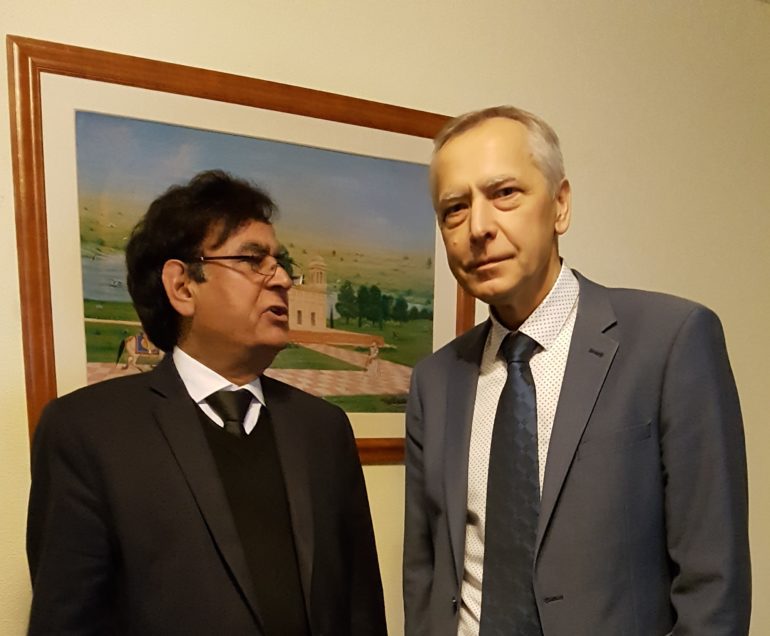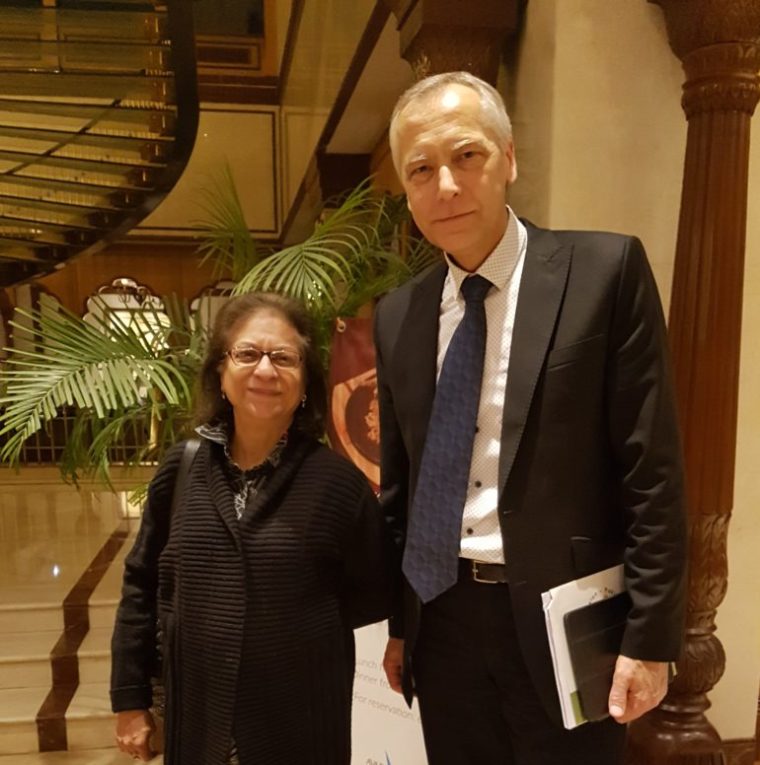
Freed Pakistani Christian Aasiya Noreen, known to the world now as Asia Bibi, has pleaded for the many others like her accused of blasphemy who, she says, are still “lying in jail for years – their decisions should also be done on merit. The world should listen to them.
“The way any person is alleged (to have committed) blasphemy without any proper investigation, without any proper proof, that should be noticed. This blasphemy law should be reviewed and there should be proper investigation mechanisms while applying this law. We should not consider anyone sinful for this act without any proof.”
She made this appeal from her refuge in Canada through a series of answers she provided to the UK’s Sunday Telegraph.
Shortly afterward, the European Post released a video that it says was provided by Noreen, in which she speaks in her native Urdu about her faith and urges fair treatment for anyone accused of a crime.
It’s hard to get a specific tally of the numbers known to be imprisoned, either awaiting trial -sometimes for years – for blasphemy, or already convicted. Many are Muslims. One figure World Watch Monitor saw quoted but could not get confirmed, after Asia Bibi was finally freed in May, was that Christians make up 17 of the 40 current ‘blasphemy’ prisoners. Christians form around 2% of Pakistan’s total population according to the Center for the Study of Global Christianity, its Co-Director Gina Zurlo told World Watch Monitor.
One couple who hit the spotlight immediately after Asia Bibi’s acquittal was Shafqat Emmanuel and his wife, Shaguftah, of Gojra, Punjab, both accused of sending blasphemous text messages. Shafqat has to use a wheelchair and has a catheter, after his backbone was fractured in an accident in 2004. Shaguftah was the main breadwinner for their four children.
Lawyer Saif ul-Malook, who – at the risk of his own life – defended Asia Bibi and successfully argued her appeal in Pakistan’s Supreme court, then promptly left Pakistan for the Netherlands (he was reported to have said that he was forced to flee) but said that he would return if her successful appeal was challenged. At the same time, he said he would now take up Shafqat and Shagfuftah’s case.
‘Justice and dignity for all Pakistanis’
The Sunday Telegraph article also referred to the crucial role for Asia Bibi’s freedom played by the EU Special Envoy on Freedom of Religion or Belief (FoRB), Jan Figel, from Slovakia, who’s worked tirelessly on her case, as well as for prisoners in Sudan and other countries.
He told World Watch Monitor that he had tried to visit Pakistan in his new role ‘from the start’ but that it had taken a year until a Pakistani high-level delegation (Minister of Trade and Attorney General) had visited his Brussels office. They invited him to Pakistan.

As a result of the week-long visit Figel made there in December 2017, an inter-faith advisory council was started in the country to look at the misuse of the blasphemy law – often to ‘grab’ disputed land or to settle personal grudges, business rivalries and so on.
One recent tactic reported by World Watch Monitor has been the apparent ‘planting’ of fake images or texts on the mobile phones of sometimes-illiterate Pakistani Christians.
Figel visited Pakistan again in May 2018. “I spoke about the importance of justice and dignity for all Pakistanis, especially minorities. I spoke tirelessly on the importance of clear signs that the Pakistani authorities are moving towards justice and the rule of law and justice for all. Justice delayed is justice denied, I used to repeat,” he told World Watch Monitor. “Asia’s Bibi’s case was a closely-watched one [globally]. No decision, or an unduly pending appeal on capital punishment without the response of the Supreme Court was a big problem”.
Pakistan’s Trade Agreement with the EU was due for re-assessment in 2018 “bringing Pakistan billions of euros trade-offs and income”, he said. “There was serious and growing concern in Europe about Pakistan’s human rights record. I told too many ‘The status quo is not enough! The country has to move forward in implementation of important international treaties and commitments’”.
Life at risk
Figel told World Watch Monitor that real progress finally started after Imran Khan became Prime Minister in summer 2018: he seemed willing to challenge some of the extremist Islamic leaders, unlike previous governments.
Asia Bibi won her appeal against her death penalty on 31 October, 2018.
However, immediately massive street protests against her, again calling for her to die, effectively paralysed life in Pakistan for several days. Prime Minister Imran Khan, who at first appeared to take a hard-line against the religious parties, appeared to give into them under pressure.
The EU Envoy realised how his life too could be at risk, when a press statement, in English, by a militant Pakistani Islamist network signaled that Imran Khan’s government had ‘caved into the EU’.
(In May 2018 Pakistan’s then-Minister for Interior, Ahsan Iqbal, who is known to support minority groups, survived an assassination after meeting with a group of Christians. Seven years earlier both the then-Governor of Punjab, Salmaan Taseer, and the Minorities Minister Shahbaz Bhatti were targeted and killed for defending Asia Bibi). That particular Islamist network has many members outside Pakistan.
Following her acquittal Asia Bibi was detained for another seven months. Mr. Figel told the Sunday Telegraph “I think Imran Khan’s government and Pakistan’s military used this delay to get the situation in the country under real control.”
In December Canada’s Prime Minister Trudeau publicly announced willingness to offer asylum at the Peace Centennial of World War I.
In January, in Pakistan’s capital, the “Islamabad Declaration” signed by over 500 Muslim clerics, publicly condemned terrorism, violence committed in the name of religion and fatwas (sacred edicts) widespread by radical Islamic leaders. Fides reported that “observers said it represents a turning point especially in the attitude towards religious minorities and sects such as Ahmadi Muslims. In fact, Fides wrote, ‘the Declaration recognizes that Pakistan is a multi-ethnic and multi-religious country, and notes that “it is the responsibility of the government to ensure the protection of the life of non-Muslim citizens in Pakistan”’.
In February, Pakistan’s Attorney-General again visited Brussels where he again met Jan Figel; the latter tweeted that he raised the fact that Asia Bibi, now freed by the Supreme Court, was still detained in effective ‘house arrest’.
#BRUSSELS: Good talks w/ Attorney General Anwar KHAN on GSP+ legal committments implementation in Pakistan. Rule of law and JUSTICE for all, including religious minorities is crucially important. pic.twitter.com/h7Z3bGbftY
— Jan Figel (@janfigel) February 26, 2019
Pakistan’s Human Rights Minister Shireen Mazari also visited Brussels. Figel liaised with Asia Bibi herself via Muhammad Amanullah, a human rights activist.
The EU Envoy confirmed directly to World Watch Monitor that the UK was not on the list of possible countries for her asylum, but that ‘there were a lot of rumours and problems around this’.
Asia Bibi was announced to have finally left Pakistan on 8 May, although it was not clear for a few days whether she had in fact joined her daughters who were already in exile in Canada.
Figel told WWM “Canada deserves international acknowledgement for its spirit of solidarity and real hospitality, also for the professionalism of its diplomacy and its immigration services. Security conditions are crucially important for Asia Bibi and her family”.
On June 25, Pakistan’s Foreign Minister, Shah Mahmood Qureshi, signed the Fourth EU-Pakistan Strategic Engagement Plan (SEP) with the EU’s High Representative for Foreign Affairs Federica Mogherini in Brussels.
Amongst points relevant to Asia Bibi’s plight were to “Develop mutually agreed co-operation on the implementation of the UN Security Council on Women, Peace and Security”, and (under ‘Democracy, Rule of Law, Good governance, and Human Rights’) the plan mentioned “Working together to ensure…protection of human rights at national and international levels” and “Enhancing…inter-faith dialogue and understanding to promote tolerance and harmony”.